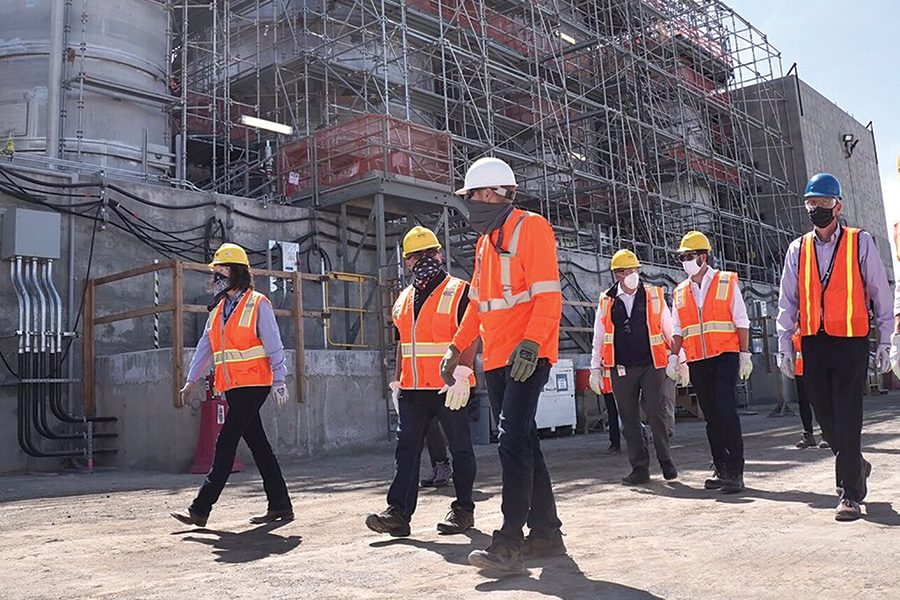
Home » Covid-19 slowed but did not stop progress on Hanford cleanup
Covid-19 slowed but did not stop progress on Hanford cleanup

April 16, 2021
An act of God. Or, among lawyers, a force majeure.
Many contracts have force majeure clauses to govern what happens when faced with circumstances beyond anyone’s control. The global Covid-19 pandemic certainly falls into this category.
How much did Covid-19 affect Hanford’s cleanup mission?
Not much in the big picture.
Some tank waste pumping will slow down.
And some inspections will be sparser for a while.
But so far, the U.S. Department of Energy (DOE) has not asked the Washington State Department of Ecology for any changes for the milestones set in the Tri-Party Agreement (TPA), said John Price, TPA section manager for Ecology.
The TPA is the legal pact between Ecology, DOE and the U.S. Environmental Protection Agency that governs Hanford’s cleanup schedule and standards.
The TPA also addresses construction and operations of the $17 billion radioactive tank waste vitrification plant that is about to start operating at Hanford.
The state and federal agencies meet regularly to negotiate changes in Hanford’s cleanup deadlines affected by technical challenges and Covid-19.
David Bowen, Ecology’s nuclear waste program manager, declined to elaborate on specific issues being covered during the meetings or to spell out a timetable for those talks. Details are confidential while the negotiations are underway.
The TPA isn’t the only controlling voice when it comes to removing highly radioactive waste from Hanford’s 177 underground tanks. A federal court consent agreement dates to 2010 is in play as well.
Like the TPA, the consent decree has been litigated and modified.
Pandemic’s effects
The Covid-19 pandemic severely reduced the number of people on site. Only 10% of the 11,000 workers in March 2020 could work at Hanford at one time. Those numbers have increased as extra protective measures have been taken.
While some Hanford workers have been affected by Covid-19, there have been no reported infections directly linked to the site.
In a March note to site employees, Hanford’s site manager advised workers that no vaccines were available to the workforce but were on offer in the community. Brian T. Vance encouraged workers to get a vaccination as soon as they became eligible.
Deadlines delayed
The reduction in workers on site led DOE to approach the state for an extension to the consent decree deadline for emptying some leak-prone single-shell tanks into newer safer double-shell tanks.
“Ecology very quickly realized it was force majeure,” Price said.
Ecology agreed to delay the deadline for pumping out nine single-shell tanks in Hanford’s A and AX tank farms for five months beyond the previous October 2026 target.
Extensions related to Covid-19 also bumped the startup of Hanford’s Direct-Feed Low Activity Waste vitrification plant to March 2024, from Dec. 31, 2023. The scheduled startup of Hanford’s high-level waste treatment plant in 2033 has been kept intact.
Also, the vitrification complex’s first major component was completed last June – the project’s massive analytical laboratory.
Price said another pandemic-related change has been DOE doing fewer on-site inspections. Ecology department employees double-check some inspections from off-site from reports instead of checking firsthand on-site.
Two other changes took place last December involving major changes in contractors.
Central Plateau Cleanup Co. began its $10 billion, 10-year central Hanford cleanup contract, succeeding CH2M Hill Plateau Remediation Co. in that role.
And Hanford Mission Integration Solutions succeeded Mission Support Alliance as the manager of 10-year $6 billion site services contract, serving in effect as Hanford’s landlord.
Also last year, DOE awarded Hanford Works Restoration, a team led by BWXT of Lynchburg, Virginia, a $13 billion 10-year contract to succeed Washington River Protection Solutions as the tank farms manager.
The award was appealed.
DOE rescinded that award and released a request for proposals for a new 10-year, $26.5 billion contract to manage both the tank farms and the vitrification project.
No timeline has been set for the bidding process.
John Stang is a Federal Way-based freelance writer who has written about Hanford extensively.
Hanford
KEYWORDS april 2021




